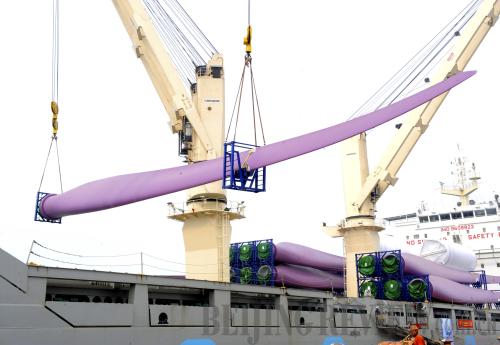Frictions over Renewable Energy
Beijing Review, September 3, 2012 Adjust font size:
China's response
A month after the United States launched the anti-dumping and countervailing investigations against the Chinese PV industry, on November 25, 2011, in accordance with the petition proposed by the China Chamber of Commerce for Import and Export of Machinery and Electronic Products and the New Energy Chamber of Commerce of the All-China Federation of Industry and Commerce, MOFCOM, in line with the provisions specified in the Foreign Trade Law of the People's Republic of China and Investigation Rules of Foreign Trade Barriers, initiated trade barrier investigations of six US support policies and subsidy measures on the renewable energy industry.
MOFCOM invited the US side to comment on the questions of the investigation within 30 days and received the US side's Opinions on the Trade Barrier Investigation Initiated by MOFCOM on November 25, 2011. The US Government asked for a petition letter and relevant documents, while other relevant parties and the public in the United States did not make any comment on MOFCOM's decision. MOFCOM took the US Government's opinions into consideration during the investigation process and handed a petition letter and relevant documents to the US Government.
The final investigation conducted by MOFCOM determined that six investigated projects encouraging renewable energy in Washington, Massachusetts, Ohio, New Jersey and California, have constituted prohibited subsidies stated in Article 3 of the Subsidy and Countervailing Measures Agreement formulated by the WTO, and violated relevant provisions in Article 3 of the WTO Subsidy and Countervailing Measures Agreement and Article 3 of the 1994 General Agreement on Tariffs and Trade.
Take encouraging projects of renewable energy in Washington as an example. The Washington State Government has provided a subsidy of US$0.15 per kwh for individuals, companies and local governments using solar power, wind power and anaerobic methane to generate power since July 2005.
MOFCOM found through investigations that the six investigated projects have formed unreasonable restrictions on the Chinese renewable energy industry and weakened Chinese renewable energy products' competitiveness in the US market, reducing the export of Chinese renewable energy products to the United States and creating an effective trade barrier for Chinese renewable energy products' entry into the US market.
MOFCOM decided to launch both anti-dumping and countervailing investigations on imports of solar-grade polysilicon from the United States and an anti-dumping investigation on imports of the same commodity from South Korea on July 23 in response to the petitions of many Chinese solar-grade polysilicon-producing companies. It will also make investigations on the injury to the Chinese solar-grade polysilicon industry and then make adjudication under the state law.
Polysilicon is a raw material used in manufacturing solar products. According to MOFCOM statistics, solar-grade polysilicon products imported by China surged 36 percent year on year to 64,600 tons in 2011, totaling US$2.6 billion. Some 60 percent of the imported polysilicon products come from the United States and South Korea. In the first half of this year, the amount of polysilicon products imported from the two countries kept increasing at a high speed. In May, 44 percent of the imported polysilicon products came from the United States and 24 percent from South Korea. China is the main market of such international polysilicon product manufacturing giants as South Korea's OCI Co. and the United States' Hemlock. Polysilicon products imported from the United States and South Korea are sold at a price lower than Chinese products' costs. Hit by the dumping of US and ROK polisilicon products, 80 percent of Chinese polysilicon product manufacturing companies have suspended production since August 2011.
According to MOFCOM, preliminary investigation results will be released by July 2013.
|
|
|
Workers load wind turbine blades to be exported overseas on board a ship at the port of Lianyungang in Jiangsu Province on May 25. [Beijing Review] |



